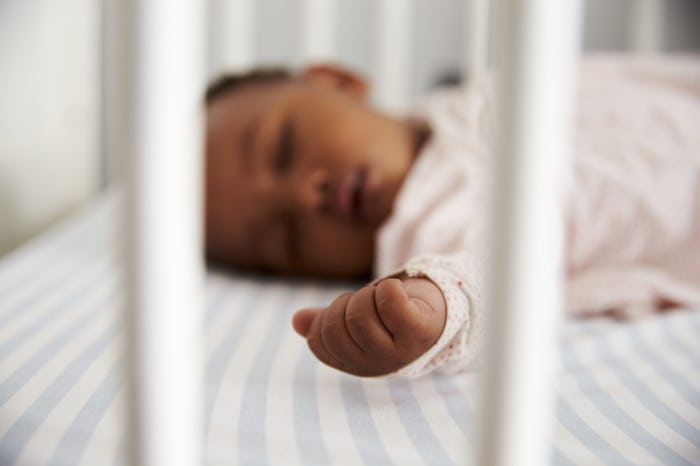Life
The Number Of Babies Dying In Their Sleep Has Risen & Here's What Experts Want Parents To Know
The looming risk of Sudden Unexpected Infant Death (SUID) weighs heavily upon the minds of many new parents. Safe sleep guidelines — such as placing babies on their backs to sleep and not giving them pillows or blankets — were put into place more than two decades ago to reduce this risk, but it appears that they are not doing enough. In fact, as a new study has found, the number of babies dying in their sleep has risen over the last 19 years. The experts behind the study have additional recommendations in light of these findings and here's what they want parents to know based on their research.
Researchers from MassGeneral Hospital for Children and Newton-Wellesley Hospital, under lead researcher Joel Bass, recently published a study in the Journal of Pediatrics. Pulling from data supplied by the Centers for Disease Control and Prevention, they found that 8,869 cases of SUID — a classification of infant deaths which includes the more commonly referenced Sudden Infant Death Syndrome (SIDS) — were recorded in the United States between the years of 1995 and 2014.
These deaths were then divided into neonatal — the first 27 days of life — and postneonatal — from 28 days to the first year. The number of deaths caused by suffocation or strangulation from both groups increased dramatically during the examined years. Neonatal cases of SUID rose from 2 percent to almost 23 percent and postneonatal cases rose from roughly 3.5 percent to 25 percent, according to Science Daily.
The American Academy of Pediatrics introduced the "Back to Sleep" campaign in 1992, which provided safe-sleeping guidelines and recommendations for parents aimed at reducing the number of SUIDS cases. However, Bass and his team showed with their study that the campaign has done little to reduce the risk. Bass explained in a press release that the number is actually going up:
The frequency of SUID in the first month of life is higher than generally recognized, at an average of 444 cases per year in the US, of which 66 per year occur on the first day and 130 occur in the first week of life. There actually has been a dramatic and unexpected increase in deaths attributed to suffocation and asphyxiation in both newborns and infants up to 1 year old, and these deaths are potentially preventable.
The study's co-author Ronald Kleinman told Science Daily that one potential explanation for the frequent deaths may be that parents don't recognize the importance of sleeping positions, for example. He explained that campaigns promoting skin-to-skin breastfeeding may have unintended consequences when mothers nurse while exhausted. Unplanned co-sleeping may lead to increased risk of SUIDS, according to Kleinman's statement in the press release.
Other experts, though, provide different advice. James McKenna, a biological anthropologist and director of the mother-baby behavioral sleep lab at Notre Dame University, told USA Today that breastfed babies are safest when they are able to "breastsleep," or sleep with their parents. When families sleep this way, McKenna explained that co-sleeping helps babies regulate their heart rate, metabolism, blood pressure, and temperature. “The baby’s habitat is the mother’s body,” he told USA Today.
Co-sleeping also leads to shallower sleep for both mother and baby, which McKenna sees as a positive, according to USA Today. Deep sleep puts newborns at risk because it makes it more difficult for them to regulate their breathing and wake up. Rather, he blames hospital policies that restrict discussion of bed sharing and lead large numbers of parents to do so without proper education on safety.
Kleinman pointed to campaigns discouraging pacifier use as another factor in infant deaths, as pacifiers have been found to reduce the risk of SIDS. Some experts fear that early pacifier use will lead to nipple confusion, which explains the campaigns that Kleinman mentioned. However, Bass and Kleinman point to contradicting information and diverging expert opinions as areas of weakness to target infant sleeping deaths in the United States. They recommend additional research to lower the risk to infants.
The study's authors recommended that additional research must be done to lower this risk to infants. But until it happens, experts urge parents to be proactive in educating themselves. I'm not here to tell anyone they should or should not co-sleep with their children, nor am I going to claim to be an expert on if or when you should introduce a pacifier. Parents must make these choices for themselves, bearing in mind the potential risks involved. As scary as the risk of SUIDS is, there are steps that parents can take to ensure their baby is as safe as they can be. Knowledge is your best weapon in the fight against SUIDS and studies such as this are crucial in keeping parents informed.
Check out Romper's new video series, Bearing The Motherload, where disagreeing parents from different sides of an issue sit down with a mediator and talk about how to support (and not judge) each other’s parenting perspectives. New episodes air Mondays on Facebook.
